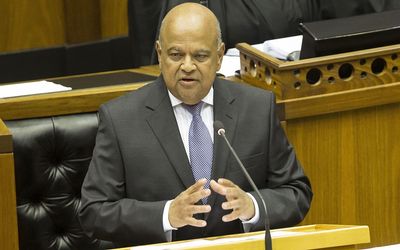A NEW approach to state-owned enterprises involving co-investment from the private sector, the rationalisation or closure of some companies, and the merging of others will be key to stabilising the government’s finances, Finance Minister Pravin Gordhan says.
The package is the most significant policy change on state-owned companies since 2003, when the government abandoned its privatisation programme.
The budget documents are fastidious in avoiding the word "privatisation", but strongly advocate "partnerships" with the private sector "to expand co-investment in economic infrastructure and social facilities" and call for, among others, a greater role by the private sector in the energy sector and in property development alongside municipalities.
In particular, the door has been opened to a minority investor in South African Airways (SAA), which Mr Gordhan said was under consideration.
The merging of SAA and SA Express, also state-owned, is being looked into and an SAA board will be put in place in a few weeks’ time.
Both Eskom and Transnet have been asked to look at possibilities for private sector participation. For Transnet, this could be in ports and freight rail.
For Eskom, this could involve the sale of equity stakes in parts of the business, such as power stations.
Briefing journalists before his speech, Mr Gordhan said: "We are at the beginning of a process. Don’t be tempted to use the P-word. We are not talking about privatisation. We are talking about minority equity participation and co-investment."
The government would implement the recommendations of the Presidential Review Committee on State-owned Enterprises, which reported in 2012, he said.
The report called in general for rationalisation of the 700 or so companies and private participation through the sale of equity or public listing.
Taking note of the political environment in which trade unions have vehemently opposed privatisation, Mr Gordhan said the shift should be acknowledged as a bold step by the government. "Here is evidence that state-owned enterprises are not sacrosanct and we are willing to take a tough look at these institutions and take a hard look at (creating) efficiencies in our economy. Are we getting effective value from the investments?" he said.
The only state-owned enterprise to receive an additional allocation — or "bail-out" — from the fiscus was the South African Post Office, which got an extra R650m. This was achieved by a reprioritisation of other expenditure, in line with Treasury policy that allocations to state-owned enterprises do not affect the budget balance.
Mr Gordhan is "still considering" a request for an additional guarantee by SAA in the region of R4bn-R5bn. Without this, the airline is not a going concern.
The Budget Review notes that SAA will have used up the full R14.5bn in guarantees already extended to it by the end of the fiscal year. A default by SAA on servicing its debt is noted as "a risk to the fiscal outlook" as it would require the government to repay a portion of the guarantees extended.
Treasury chief director Avril Halstead said the groundwork to prepare specific state-owned companies for private investment was at an early stage. A plan for SAA was expected to take the better part of a year to develop.

Finance Minister Pravin Gordhan delivers his 2016 budget speech in Parliament in Cape Town on Wednesday. Picture: BLOOMBERG/HALDEN KROG
A NEW approach to state-owned enterprises involving co-investment from the private sector, the rationalisation or closure of some companies, and the merging of others will be key to stabilising the government’s finances, Finance Minister Pravin Gordhan says.
The package is the most significant policy change on state-owned companies since 2003, when the government abandoned its privatisation programme.
The budget documents are fastidious in avoiding the word "privatisation", but strongly advocate "partnerships" with the private sector "to expand co-investment in economic infrastructure and social facilities" and call for, among others, a greater role by the private sector in the energy sector and in property development alongside municipalities.
In particular, the door has been opened to a minority investor in South African Airways (SAA), which Mr Gordhan said was under consideration.
The merging of SAA and SA Express, also state-owned, is being looked into and an SAA board will be put in place in a few weeks’ time.
Both Eskom and Transnet have been asked to look at possibilities for private sector participation. For Transnet, this could be in ports and freight rail.
For Eskom, this could involve the sale of equity stakes in parts of the business, such as power stations.
Briefing journalists before his speech, Mr Gordhan said: "We are at the beginning of a process. Don’t be tempted to use the P-word. We are not talking about privatisation. We are talking about minority equity participation and co-investment."
The government would implement the recommendations of the Presidential Review Committee on State-owned Enterprises, which reported in 2012, he said.
The report called in general for rationalisation of the 700 or so companies and private participation through the sale of equity or public listing.
Taking note of the political environment in which trade unions have vehemently opposed privatisation, Mr Gordhan said the shift should be acknowledged as a bold step by the government. "Here is evidence that state-owned enterprises are not sacrosanct and we are willing to take a tough look at these institutions and take a hard look at (creating) efficiencies in our economy. Are we getting effective value from the investments?" he said.
The only state-owned enterprise to receive an additional allocation — or "bail-out" — from the fiscus was the South African Post Office, which got an extra R650m. This was achieved by a reprioritisation of other expenditure, in line with Treasury policy that allocations to state-owned enterprises do not affect the budget balance.
Mr Gordhan is "still considering" a request for an additional guarantee by SAA in the region of R4bn-R5bn. Without this, the airline is not a going concern.
The Budget Review notes that SAA will have used up the full R14.5bn in guarantees already extended to it by the end of the fiscal year. A default by SAA on servicing its debt is noted as "a risk to the fiscal outlook" as it would require the government to repay a portion of the guarantees extended.
Treasury chief director Avril Halstead said the groundwork to prepare specific state-owned companies for private investment was at an early stage. A plan for SAA was expected to take the better part of a year to develop.

























Change: -0.47%
Change: -0.57%
Change: -1.76%
Change: -0.34%
Change: 0.02%
Data supplied by Profile Data
Change: -1.49%
Change: 0.08%
Change: -0.47%
Change: 0.00%
Change: -0.04%
Data supplied by Profile Data
Change: -0.34%
Change: 0.03%
Change: -0.10%
Change: -0.22%
Change: -0.69%
Data supplied by Profile Data
Change: -0.28%
Change: -1.15%
Change: -0.07%
Change: -1.21%
Change: -0.22%
Data supplied by Profile Data